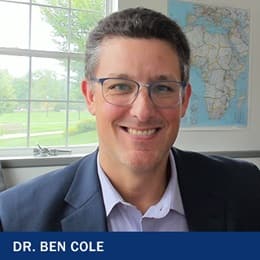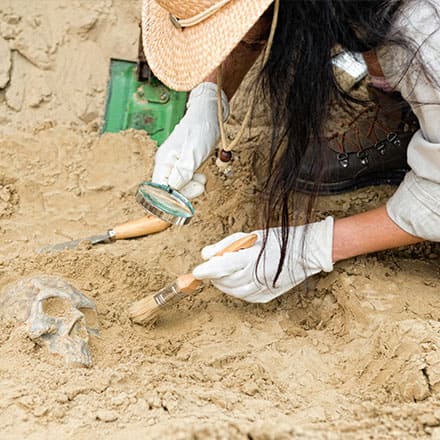What is Political Science All About?

Understanding the Numbers
When reviewing job growth and salary information, it’s important to remember that actual numbers can vary due to many different factors — like years of experience in the role, industry of employment, geographic location, worker skill and economic conditions. Cited projections do not guarantee actual salary or job growth.
When the term political science comes to mind, you might think of presidential campaigns, political parties or policy analysis on the evening news. But political science actually seeks to analyze and predict critical issues that affect our lives every day, including globalization, terrorism, climate change, civil rights and diplomacy.
According to Britannica, "politics" refers to all activities related to influencing the policies or actions of a government, including getting and keeping power. Political science, sometimes abbreviated to poli sci, refers to the science behind these activities.
What is Political Science?
The Stanford Encyclopedia of Philosophy reveals that the field of political science is a social science that dates back 2,500 years with the works of Plato and Aristotle, who defined it as the "study of the state" and were interested in the greater good of their citizens.
Today, the American Political Science Association notes that political science describes the study of governments, public policies and political behavior both in the United States and abroad.

According to Cole, political science is a field within the social sciences dedicated to studying and explaining how and why power is distributed, decisions are made and policies are implemented.
"In a sentence, I would define political science as the scientific study of power dynamics," Cole said. "As a field, it is usually broken into several sub-disciplines."
If you're studying in the United States, he said these sub-disciplines include:
- American government
- Comparative politics
- International relations
- Political theory
According to Cole, public administration is sometimes included here, as well.
What Does a Political Scientist Do?
Using a variety of tools and methodologies, political scientists examine the processes, systems and political dynamics of countries and regions of the world and how they affect their constituents, according to the American Political Science Association.
"We usually use the term 'political scientist' to refer to someone with an advanced degree in the field who is conducting political science research," Cole said. "In other words, a political science professor, think tank resident or someone with a similar level of expertise."
Some political scientists might look at why governments adopt particular policies or what issues drive citizens to vote. Some might develop surveys to predict political opinions or analyze voting trends, while others may focus on statistics to analyze election results, The College Board notes.
BLS said specific duties of political scientists can include:
- Analyzing and evaluating policies or laws
- Collecting and analyzing public opinion surveys
- Predicting future political and social trends
- Researching national political systems or a country’s foreign relations
- Tracking current events, political decisions and assess their impact
They might evaluate the financial impact of specific policies, such as health care reform, collect data from public opinion surveys to analyze how different subgroups feel about a new law, policy or candidate; or even forecast social trends based on historical data, according to the U.S. Bureau of Labor Statistics.
How to Become a Political Scientist
Before becoming a political scientist, you'll need to determine if the path is right for you.
In addition to being inquisitive, other skills political scientists find valuable according to the BLS include:
- Analytics skills
- Communication skills
- Creativity
- Critical-thinking skills
It's also important to consider if you have passion for the type of work you'll find yourself doing.
"Working using political science methods and skills is very broad and can be immensely satisfying," Cole said. "I love going deep into datasets and doing statistical modeling."
If you have the skills and passion for the field, pursuing a degree in political science is a logical next step.
Is Political Science a Good Major?
Studying political science develops strong research, writing and analytical skills and opens the door to a diverse number of careers that aren't exclusive to a role in government or politics. The Princeton Review suggests that to be successful in political science, your undergraduate program should emphasize the following knowledge and skills:
- A strong understanding of your audience
- Ability to manage crises and solve problems
- Writing and research skills
- Public speaking and presentation skills
- Proficiency with social media
As an undergraduate, you can expect to take courses in the sub-fields of political science, including American politics, comparative politics, international relations and political theory, in addition to liberal arts courses. These courses focus on political concepts, political behavior, policy issues and structures of government in the United States and across the globe, according to the American Political Science Association.
No matter what area of political science you study, the critical skills you develop in research, analysis and communications can help you succeed both inside and outside the political arena.
Find Your Program
What Can You Do With a Political Science Degree?
A political science degree can open the door to a diverse array of roles that allow you to apply your writing and analytical skills across a wide range of industries. If you are asking yourself, “Is a political science degree worth it?” consider the following potential political science careers:
- Political Scientist: If you're interested in researching political subjects, collecting data or forecasting trends, a career as a political scientist allows you to work in government, education or for a nonprofit organization, according to BLS. The median annual salary for political scientists with graduate degrees was $128,020 in 2022, BLS reports.*
- Policy Analyst: Apply your research skills as a policy analyst to evaluate current policies and events using public opinion surveys, economic data and election results. From these sources, policy analysts look to anticipate the effects of new systems, according to BLS. Policy analysts often work directly in government or for non-government organizations that lobby for policy adjustments. Some for-profit companies use policy analysts to help influence political action.
- Public Relations Specialist: As a public relations specialist, you'll manage the public image of businesses, government and nonprofit organizations. You could also represent special interest groups, associations or political campaigns. Political science courses place heavy emphasis on developing writing and speaking skills, which is beneficial for success in a public relations role, according to the American Political Science Association.
Job duties include responding to information requests from the media, writing speeches, organizing events, building social media campaigns, and analyzing public opinion, according to BLS. The median annual wage for public relations specialists was $67,440 in 2022, BLS reports, with 6% growth projected by 2032.*
Data Analyst: Cole noted that it's also common for those with a political science background to find work in data analysis. If you want to become a data analyst, you could use your research skills and critical thinking abilities to tell stories about data.
According to BLS, mathematicians and statisticians made a median salary of $99,960 in 2022 and the field is projected to grow 30% by 2032 — much faster than average.*
- Market Research Analyst: Winning political campaigns and successful policy decisions rely on good primary and secondary market research. As a market research analyst, you apply math and analytical skills to examine the profitability of a product or service. In politics, you might use market research to help a candidate or campaign shape a strategy.
In addition to collecting data through surveys and opinion polling, market research analysts interpret and forecast data for their organization or clients, according to BLS. The median annual wage for market research analysts was $68,230 in 2022, BLS reports.*
While those are some of the most common positions, there are many good fits for people with backgrounds and education in political science.
"Most political science majors do not become political scientists, but rather work in all sorts of fields applying the methods, skills and perspectives they developed in their studies," Cole said. "One of my former classmates got into corporate lending in the banking sector, for example, partly on the basis of his skill in working with people."
He said another former classmate is now a successful novelist, his college roommate now works for the U.S. Foreign Service as a diplomat and a former student now works at a nonprofit in Mozambique.
No matter how you plan to change the world, the degree can help you build a versatile skillset to leverage throughout your career.
Learn about SNHU's bachelor's in political science. Find out what courses you'll take, skills you'll learn and how to request information about the program.
*Cited job growth projections may not reflect local and/or short-term economic or job conditions and do not guarantee actual job growth. Actual salaries and/or earning potential may be the result of a combination of factors including, but not limited to: years of experience, industry of employment, geographic location, and worker skill.
Krysten Godfrey Maddocks ’11G is a writer who covers K-12 and higher education topics, including policy and the role of digital technology in education. She spent almost a decade working in various marketing roles at an educational assessment company before launching a strategic marketing company. Maddocks earned a master's degree in marketing from Southern New Hampshire University and a bachelor's degree in English/ journalism from the University of New Hampshire. Connect with her on LinkedIn.
Explore more content like this article

SNHU Spotlight: Tamica Matos, BA in Human Services Grad

What Do Sociologists Do? The Surprising Paths You Can Take

What Can You Do with an Anthropology Degree?
About Southern New Hampshire University

SNHU is a nonprofit, accredited university with a mission to make high-quality education more accessible and affordable for everyone.
Founded in 1932, and online since 1995, we’ve helped countless students reach their goals with flexible, career-focused programs. Our 300-acre campus in Manchester, NH is home to over 3,000 students, and we serve over 135,000 students online. Visit our about SNHU page to learn more about our mission, accreditations, leadership team, national recognitions and awards.

